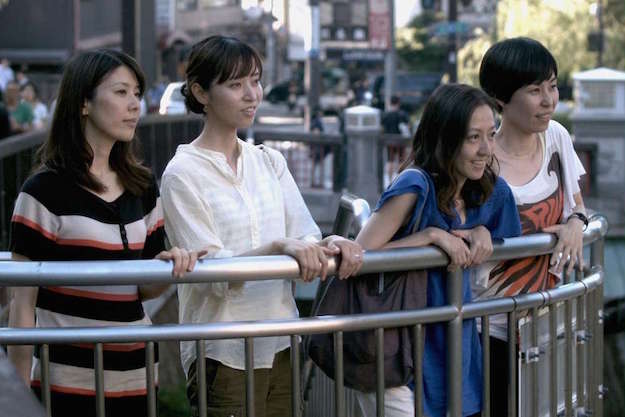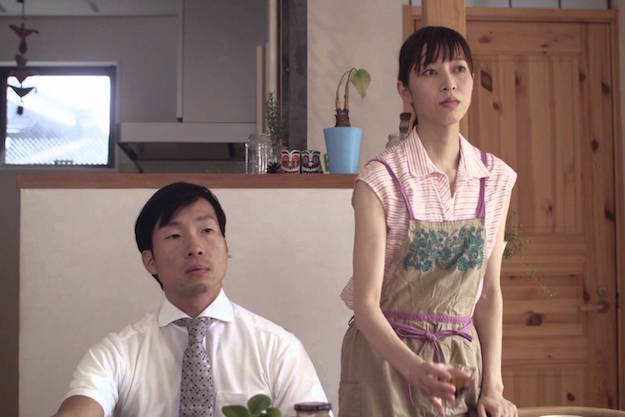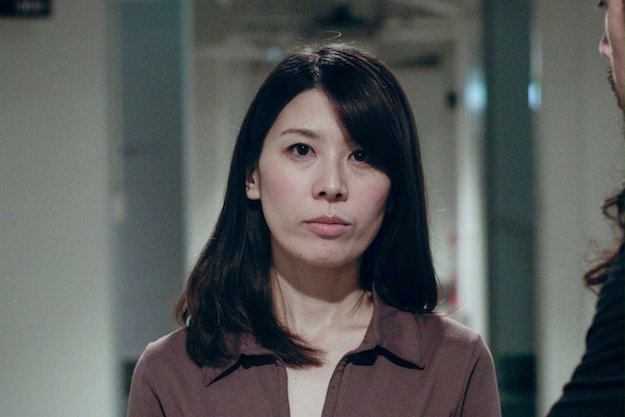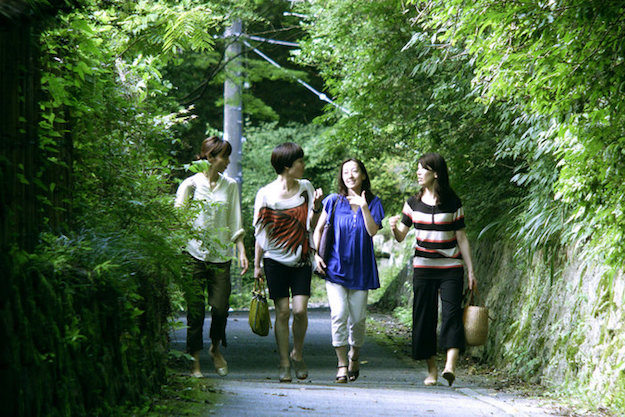Film of the Week: Happy Hour

According to Octave, the character played by Jean Renoir in The Rules of the Game, “The awful thing about life is this: everyone has their reasons.” Whether viewed as awful or otherwise, the insight has become emblematic of a certain kind of observational humanistic cinema, and the proposition has rarely been explored so assiduously or at such calm length as in Ryusuke Hamaguchi’s 316-minute Happy Hour.
We often associate extremely long fiction films either with a sort of expansive fabulism (as in Béla Tarr’s work) or with experimental dramas that seek their own forms as they go along (Lav Diaz, Jacques Rivette’s Out 1). Happy Hour could be described without too much distortion as a relatively conventional piece of psychological realism, about the emotional lives of four women and the people around them: as a sort of ensemble melodrama. But the film’s unusual running time, and the leisurely pace at which Hamaguchi allows his characters to unfold on screen—to become themselves, as it were—causes the film to evolve slowly and subtly into something else. It becomes a very delicate piece of anti-melodrama, in a sense, insofar as all the powerful emotions it addresses are exposed with a somewhat scientific analytical detachment, so that the “reasons” that drive everyone become vividly understood by us—not 100 percent clear, transparent, or consistent, but certainly comprehended with a certain depth and immediacy. If this makes Happy Hour sound like a chilly exercise in emotional forensics, rest assured you’ll feel moved at certain points—all the more so because Hamaguchi consistently resists yanking our heartstrings. In fact, in the way it patiently teases minor-key emotional and psychological insights out of ostensibly mundane moments studied at length, the film this most reminds me of is Edward Yang’s Yi Yi.
Happy Hour begins by introducing us to four women living in Kobe, friends all approaching 40, who set out for a picnic at the top of a hill. At the summit, they sit surrounded by heavy mist, and one jokes, “This resembles our future.” In fact, it rather resembles the hours that will follow, in which we watch the four navigate themselves out of their own personal mists, while trying to make our own way through the sometimes elusive complexities of their lives. As the film moves along, we meet the women either singly or in different combinations, at home, at work, or socializing. Akari (Sachie Tanaka) is a hospital nurse, divorced, of the four women the one with the hardest exterior, who spends much of her work time showing a kind of pitiless tough love to a clueless novice assistant. Fumi (Maiko Mihara)—who for me remained the least readable of the four—is elegant, self-possessed, somewhat taciturn. She runs an arts center called PORTO—although it seems to be little more than a drab office-type space—where her publisher husband Takuya is organizing a series of events. Sakurako (Hazuki Kikuchi, her nervous, watchful demeanor irresistibly reminiscent of the young Shelley Duvall) is a housewife with a teenage son, a bluff but affable mother-in-law, and a glum, bossy salaryman husband, the sort who comes home and instantly demands rice and tea. Then there’s Jun (Rira Kawamura), seemingly slightly older, who later lands a surprise on the group which will, directly or indirectly, catalyze changes in all their lives.

The first part of the film, as the title suggests, is largely to do with moments where the characters attain glimmers of happiness—not least, as in so many films about groups of female friends, through relaxed moments of comradeship. Bonding or—as one character earnestly puts it, “communication”—is a key theme throughout. The star guest at Takuya’s first event is a man named Ukai, supposedly an artist, although his claim to that title seems to hinge on his bizarre ability to set pieces of earthquake debris standing on end (the film’s only hint of the oddball or uncanny), a talent he briefly demonstrates with a chair. Otherwise, Ukai’s “art” manifests itself here in a sort of mindfulness seminar, during which he encourages participants to listen to each other’s bellies, place their foreheads together and make stabs at experimental telepathy. In reality, his techniques seem harmless fun, although they also allow certain male and female characters to size each other up for later potential romance.
But, played out at considerable length, together with a post-session get-together in which participants talk about themselves, the workshop offers a wonderful method to discover the nuances of the ways these characters exist on screen. Hamaguchi’s actors, largely first-timers from Kobe who rehearsed through extended workshop sessions, seem incredibly at ease throughout, and the relaxed tone of the film, even when it’s at its most formal, allows for a sort of extended bonding process between cast and viewers. As a result, you may not understand these characters better by the end of the film, but you will feel you know them: which is how we often feel about people we get to spend time with in real life, a kind of intimate knowledge that may not be deep but that’s certainly more than superficial.
The event that sets the film spinning on a new orbit comes during the post-session drinks, when Jun announces that she’s going through divorce proceedings, having had an affair with a younger man. Akari is furious that Jun has never confided in her about it before, but Jun’s friends agree to join her in court, where her husband Kohei (Yoshitaka Zahana), a molecular biologist, is doggedly opposing her application for a divorce. Throughout the court scene, shot very formally with many a symmetrical frontal composition, Kohei is seen glaring silently and expressionlessly in a pale suit: he looks like a chilly bastard, and we’re inclined to dislike him from the start. But it’s typical of Happy Hour’s nuanced approach to human behavior that Kohei later reveals an unsuspected sensitivity. Called on to stand in as host of a Q&A with a young writer, he offers some surprisingly perceptive insights into artistic creativity. Similarly, while the film has us rooting for Jun against Kohei, her own behavior isn’t obviously admirable. When Kohei shyly visits her at home, she phones her lawyer and claims he’s acting aggressively, before nearly pushing him out of the window—all the potential for melodrama quietly defused by the scene being shot in silhouette against the daylight outside. People in Happy Hour behave inconsistently, unpredictably, not always sympathetically, and that’s the film’s richness.

The narrative increasingly fragments into subplots and digressions, but it all holds together with the cohesion of a well-structured novel. Jun meets a woman on a bus, who tells her own family history; the thread stops there, as the woman gets off, but the episode feels integral to the overall drift. Sakurako’s teenage son gets his girlfriend pregnant, but her husband is too busy to do the expected thing and apologize to the girl’s parents; that’s left to Sakurako and her mother-in-law, who afterward cuts through the business of decorum by noting that the two kids are probably in love. Elsewhere, the four friends head off for a break at a hot springs resort, where Takuya is accompanying a young female writer he’s editing, Yuzuki Nose; the story Yuzuki later reads at PORTO inescapably suggests that she has a thing for Takuya. In fact, at the spa town, Fumi’s friends—most untactfully, you can’t help thinking—keep pressing Fumi on her marriage. “It’s like there’s a thin veil between you two, like you’re both trying not to touch it,” says Akari—then adds, “That veil didn’t exist when he was walking with Miss Nose.” The friends all question Fumi, but it’s all done so quietly, with such calm analytical seriousness, that it never feels intrusive. There is indeed something scientific, as well as philosophical, in these characters’ considered contemplation of human mores. Kohei himself makes the connection clear when quizzing Yuzuki on her fiction and describing his own work on egg development: “Putting it at its simplest, I scrutinize how things happen.” And that, at its simplest, is Hamaguchi’s game too.
It’s perhaps for that reason that the film’s look cultivates an effect of undemonstrative spareness. Shot by Yoshio Kitagawa, the restricted color palette of beiges, grays, and dull maroons, and the use of bland, even antiseptic urban spaces—courtrooms, cafés, PORTO itself—suggest a sort of laboratory situation in which emotions can reveal themselves uninflected by externals. The seemingly understylized execution is in fact deceptive: there are distinct but discreet touches of visual rhetoric throughout, including a number of shots in which characters seem to speak directly to camera, a number of Ozu-style compositions and certain minor-key flourishes like the shot in which, after Jun gets out of a car, the camera holds on her seat’s headrest. There are odd narrative flourishes too, breaking up the everyday realism of the narrative: a leitmotif that increasingly resembles a running joke involves characters fainting or falling down staircases at times of stress.
Hamaguchi—whose previous features include Intimacies (12) and Touching the Skin of Eeriness (13)—has done an amazing job in assembling this cast and getting them to breathe as easily as they do. Shuhei Shibata excels as the charismatic, slightly creepy Ukai, his boho flakiness accentuated by the actor’s facial and vocal resemblance to Adam Driver. The film especially represents an astonishing debut for Sachie Tanaka as Akari, whose toughness and prickly complexity are mesmerizing. It’s an especially strong performance given that the character is so acutely self-aware, especially when it comes to the problematics of her work and private life (Akari has avoided finding too much excitement in sex, she says, because it would blunt the sharpness she requires for nursing); when Akari has a rapturous moment of self-release on a dance floor, you feel Tanaka has truly earned that moment for her.

There are a number of such moments throughout—moments of feel-good release, if you must, but the film’s detachment allows us to understand that it’s the characters who feel good and that we shouldn’t expect to vicariously cash in on their catharsis. Even so, when some of the women finally achieve personal breakthroughs, while we might not get the easy glow a comparable Hollywood BFFs dramedy might award us, we feel we know everyone in this story well enough to share in their triumph. And yes, you do rather feel that you’d like to see Hamaguchi revisit these people five years from now, to see where they went next—for old acquaintance’s sake, as it were.
Jonathan Romney is a contributing editor to FILM COMMENT and writes itsFilm of the Week column. He is a member of the London Film Critics Circle.







